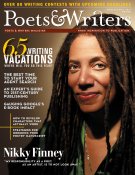For the past twelve months, five poets and five composers from across the country have been working together on a unique mission: to collaboratively explore in words and sound the idea of sanctuary. Their project will culminate this month in the performance of a concert, titled The Sanctuary Project, by New York City–based contemporary music ensemble Lunatics at Large, a seven-member group that includes strings, winds, piano, and voice, and is directed by Swiss pianist Evi Jundt.
The project originated in November 2009 when Jundt, while commissioning a work for her ensemble, met composer Laura Koplewitz, who had previously written pieces based on the sanctuary theme. “We discussed the idea of having a concert where Laura would write something similar for us,” Jundt says. “Then I thought, ‘Well, why don’t I ask several composers to write works for a thematic performance?’”
The idea of including poets sprang from Jundt’s desire for her soprano to sing from an original text. “I picked the poets intuitively, by reading their work and trying to sense who would connect to the theme and write something inspiring for both the composers and the public,” she says. “I wasn’t looking for particularly experimental poets or composers, but rather for artists with an artistic language that would create a sense of sanctuary.”
The composition’s creation began with the poets—Robert Buchert, who lives in Provo, Utah; Ryan Vine of Duluth; and New York City writers Joanna Fuhrman, David Shapiro, and Yerra Sugarman—who were assigned to write new poems with sanctuary in mind. Then the composers—André Brégégère, Mohammed Fairouz, Raphael Fusco, and Koplewitz, all working in New York City, and Alex Shapiro, who lives in Friday Harbor, Washington—each chose one or more poems and created a new chamber work meant to reflect the essence of the written words. To accommodate the soprano, the composers were also asked to weave the words into their music. Over the course of the project, some composers requested that their chosen poets revise their verse, and some poets reciprocated, pressing for further collaboration with composers. Once the musical pieces were completed, the poets were commissioned to pen a final round of poems based on their experience of the new music—closing the creative loop.
One of the most interesting collaborations, Jundt says, occurred between sixty-four-year-old Jewish poet (and violinist) David Shapiro and Fairouz, a twenty-five-year-old Arab American composer, who broke the rules a bit by choosing three sonnets from a book Shapiro wrote more than three decades ago—Unwritten, about the death of Socrates—to create a chamber piece based on what he calls “the death of an intellectual sanctuary.”
“I don’t write poetry, I’ve always shied away from it, but you don’t write over a hundred art songs and song cycles without being obsessed with text in some way,” Fairouz says. “And David doesn’t just play the violin, he’s a virtuoso, so in a sense I’m dealing with someone who can speak the language, the language of music.”
Because of this, Shapiro says he understood whenever Fairouz would call in the middle of the night to request that he recite his poems again, so the composer could detect the unique cadence of the poet’s voice. “Mohammed is very attuned to what someone has called ‘the science of vowels,’ because poetry is always already music, isn’t it? It can’t escape it, we have a tone for every word.”
The exhibition of poetry and song’s shared power is at the heart of Jundt’s venture. “I believe poetry really becomes alive once it’s spoken,” she says, “and that’s exactly what happens with music, which is just black dots on the page until it’s played and really takes the form it’s supposed to possess.”
This spring Lunatics at Large will give a series of concerts in New York City—with the poets reciting their work between the musical compositions—that will premiere at Carnegie Hall on March 21. In April performances will be held in various city locations that could themselves serve as sanctuaries, including Christ & Saint Stephen’s Episcopal Church (120 West Sixty-Ninth Street), the Synagogue for the Arts (49 White Street), and the Workshop for Music Performance Concert Hall (31 East Twenty-Eighth Street). The ensemble also plans to present the work in poetry classes at New York University, Columbia University, and the New School, performances that will include conversations with the poets and composers.
Fuhrman says she’s eager to discuss the process, though she admits she struggled to begin. “I wasn’t sure I’d be able to write a poem with the title of ‘Sanctuary’ without making it completely ironic. Yet, in writing the poem, I was forced to rethink what a sanctuary could mean—perhaps it exists, or struggles to exist, between people, instead of in a space.”
Shell Fischer is a freelance writer and editor based in Virginia’s Shenandoah Valley. The initial chapter of her first novel, “The Joy of Mom,” received the 2009 Bronx Center for the Arts Chapter One Award.






